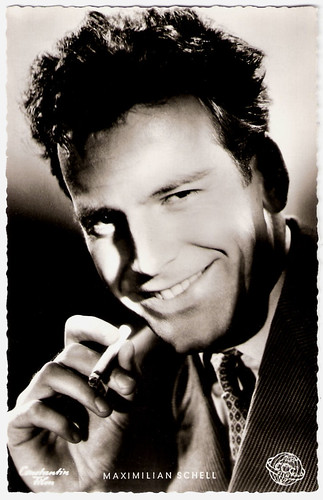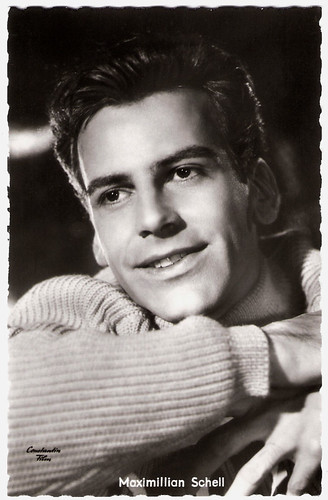
German postcard by Friedr. W. Sander-Verlag, Minden/Kolbri-Karte, no. 2005. Photo: 20th Century Fox. Publicity still for Judgment at Nuremberg (Stanley Kramer, 1961).

Belgian postcard by Cox, no. 7.

Spanish card by Ediciones Raker, Barcelona, no. 194. Photo: 20th Century Fox. Publicity still for Judgment at Nuremberg (Stanley Kramer, 1961).
An Accidental Hollywood Career
Maximilian Schell was born in Vienna, Austria in 1930. He was the son of Margarethe Schell née Noe von Nordberg, an actress who ran an acting school, and Hermann Ferdinand Schell, a Swiss poet, novelist, playwright, and owner of a pharmacy. Schell's late elder sister, Maria Schell, was also an actress; as were their two other siblings, Carl and Immy (Immaculata) Schell.
When Austria became part of Nazi-Germany after the ‘anschluss’ of 1938, the Schell family moved to Zurich, Switzerland. Maximilian's interest in acting began at early age. When 11, he appeared in a professional production of 'William Tell' and in the same year he wrote a play which was produced by his school. Later he served in the Swiss Army, achieving the rank of corporal.
In 1952, he began acting at the Basel Theatre. He played a small role as a desperate deserter in the war film Kinder, Mütter und ein General/Children, Mother, and the General (László Benedek, 1955) starring Hilde Krahl. That year he also played parts in Der 20. Juli/The Plot to Assassinate Hitler (Falk Harnack, 1955), Reifende Jugend/Ripening Youth (Ulrich Erfurth, 1955) and Ein Mädchen aus Flandern/The Girl from Flanders (Helmut Käutner, 1956) with Nicole Berger.
His breakthrough in the cinema was the German crime film Die Letzten werden die Ersten sein/The Last Ones Shall Be First (Rolf Hansen, 1957). The film, which starred O.E. Hasse and Ulla Jacobsson, was entered into the 7th Berlin International Film Festival.
Schell made his Hollywood debut as a Nazi officer in the World War II film The Young Lions (Edward Dmytryk, 1958) starring Marlon Brando and Montgomery Clift. According to Jon C. Hopwood at IMDb “quite by accident, as the producers had wanted to hire his sister Maria Schell, but lines of communication got crossed, and he was the one hired.”

West-German collectors card in the Unsere Filmlieblinge series by Kauvit, München (Munich). Photo: Real-Film / Europa.

German postcard by WS-Druck, Wanne-Eickel, no. 241. Photo: Real-Film.

German postcard by Kolibri-Verlag, Minden/Westf.no. 2275. Photo: Real / Europa / Gabriele. Publicity still for Ein Herz kehrt heim/A Heart returns home (Eugen York, 1956).
Oscar
Maximilian Schell stayed in America and in 1959, he appeared as Hans Rolfe, an enigmatic defense attorney, in a live Playhouse 90 television production of Judgment at Nuremberg (George Roy Hill, 1959). In 1961, Schell reprised the role for the big screen remake Judgement at Nuremberg (Stanley Kramer, 1961) with an all star cast including Spencer Tracy, Burt Lancaster, and Marlene Dietrich.
As the first German speaking actor after World War II, Schell won the Academy Award for Best Actor. He also won a Golden Globe and the New York Film Critics Circle Award for the role.
In the following years, he starred in international productions like the Italian-French drama I sequestrati di Altona/The Condemned of Altona (Vittorio De Sica, 1962) opposite Sophia Loren, the heist film Topkapi (Jules Dassin, 1964) with Melina Mercouri, the British drama Return from the Ashes (J. Lee Thompson, 1965) with Ingrid Thulin, and the British espionage–thriller The Deadly Affair (Sidney Lumet, 1966) based on John le Carré's first novel Call for the Dead.
In Hollywood, he was often top billed in Third Reich themed films, such as Counterpoint (Ralph Nelson, 1968), The Man in the Glass Booth (Arthur Hiller, 1975) – a role for which he was nominated for an Academy Award, Cross of Iron (Sam Peckinpah, 1977), Julia (Fred Zinnemann, 1977) – for which he got another Oscar nomination, and A Bridge Too Far (Richard Attenborough, 1977).
However, he also played in various films with different subjects, including the historical disaster film Krakatoa, East of Java (Bernard L. Kowalski, 1969), the Science Fiction film The Black Hole (Gary Nelson, 1979), and the crime comedy The Freshman (Andrew Bergman, 1990) starring Marlon Brando and Matthew Broderick.

German postcard by Rüdel-Verlag, Hamburg-Bergedorf., no. 1868. Photo: Gabriele / Real / Europa. Publicity still for Ein Herz kehrt heim/A Heart Goes Home (Eugen York, 1956).

German postcard by Kunst und Bild, Berlin-Charlottenburg, no. V 128. Photo: CCC / Constantin / Arthur Grimm. Publicity still for Die Letzten werden die Ersten sein/The Last Ones Shall Be First (Rolf Hansen, 1957).

German postcard by Kolibri-Verlag G.m.b.H, Minden-Westf., no. 2445. Photo: Arthur Grimm / CCC / Constantin. Publicity still for Die Letzten werden die Ersten sein/The Last Ones Shall Be First (Rolf Hansen, 1957).
Marlene and Maria
Maximilian Schell has also served as a writer, producer and director for a variety of films. In 1968, Schell produced and starred in the adaptation of Kafka's novel Das Schloss/The Castle. Two years later, Erste Liebe/First Love (1970) - written, directed, produced, and starred in by Schell - was hailed by the critics. His Der Fußgänger/The Pedestrian (1974), in which he also starred, was nominated for the Oscar for Best Foreign Language Film and won a Golden Globe. His documentary on Marlene Dietrich, Marlene (1984) was based on the audio tape recordings of his 17-hours-long interview session with Dietrich. Using original footage, documentary material and interview passages, he managed to present an intimate portrait of her, which won also several awards.
18 years later, he made a documentary about his late sister Maria Schell, Meine Schwester Maria/My Sister Maria (2002). Connor McMadden at AllMovie: "Using excerpts of her feature films along with home movie footage, Schell explores the high points his sister's career throughout the 1950s, as well as the personal problems that cast her into obscurity only a decade later. The film offers quite a few emotional peaks, especially when an elderly Maria Schell goes before her brother's camera to speak candidly about her life, and a suicide attempt which she refers to as her 'first death.'"
In addition to his film career, Maximilian Schell has also been active as director, writer and actor in the European theatre. In 1958, he made his Broadway debut in Ira Levin’s 'Interlock'. In 1965, he starred in John Osborne’s groundbreaking 'A Patriot for Me', first at London’s Royal Court Theatre and later on Broadway. He has twice played 'Hamlet' on stage, originally under the direction of the legendary Gustaf Gründgens and later under his own direction. In 1972 he starred in Peter Hall's German language première of Harold Pinter's 'Old Times' at the Burgtheater in Vienna. In 1977 he directed 'Tales from the Vienna Woods' at the National Theatre in London.
In later life he also began directing operatic productions, starting with Giuseppe Verdi's La Traviata. This passion was triggered when he was performing in the play 'Jedermann' (Everyman) in Salzburg, Austria from 1978-1982, and he came into contact with several musical conductors including Leonard Bernstein, James Levine and Claudio Abbado. In 2006 he appeared in Arthur Miller's 'Resurrection Blues' directed by Robert Altman at the Old Vic in London.
He also often appeared on television, such as in the miniseries Peter the Great (Marvin J. Chomsky, Lawrence Schiller, 1986), with Vanessa Redgrave and Laurence Olivier. He was twice been nominated for an Emmy for his TV work, and in 1993, he won a Golden Globe for his part as Vladimir Lenin in the HBO miniseries Stalin (Ivan Passer, 1992). In 1990, he had refused to receive the Honorary German Film Award because he felt too young to be awarded with an award for lifetime achievement. For German television, he played in the television miniseries The Return of the Dancing Master (Urs Egger, 2004), which was based on Henning Mankell's crime novel.
Through the decades he continued to star in international film productions, such as The Rose Garden (Fons Rademakers, 1986), Left Luggage (Jeroen Krabbé, 1998), Deep Impact (Mimi Leder, 1998), Vampires (John Carpenter, 1998), and the American comedy The Brothers Bloom (Rian Johnson, 2008) with Adrien Brody and Mark Ruffalo. At IMDb, Jon C. Hopwood writes: “with the exception of Maurice Chevalier and Marcello Mastroianni, Schell is undoubtedly the most successful non-Anglophone foreign actor in the history of American cinema.”
Maximilian Schell was married to actress Natalya Andreychenko (1985-2005). Their daughter is actress Nastassja Schell (born in 1989). He was also the godfather of actress Angelina Jolie. Atb the end of his life, Maximilian Schell could be seen in two films, Les brigands (Pol Cruchten, Frank Hoffmann, 2013) opposite Tchéky Karyo, and An Artist's Emblem (Michael J. Narvaez, 2013) with Harry Dean Stanton.

West-German postcard by Rüdel-Verlag. Photo: Real-Film / Europa-Film / Haenchen. Maximilian Schell in Die Ehe der Dr. med. Donwitz/Marriage of Dr. Danwitz (Arthur Maria Rabenalt, 1956).

West-German postcard by Kunst und Bild, Berlin, no. I 471. Photo: Real / Europa / Haenchen. Kai Fischer and Maximilian Schell in Die Ehe des Dr. med. Danwitz/Marriage of Dr. Danwitz (Arthur Maria Rabenalt, 1956).

West-German postcard by Kolibri-Verlag G.m.b.H, Minden/Westf, no. I 471. Photo: Grimm / CCC / Constantin Film. Ulla Jacobsson and Maximilian Schell in Die Letzten werden die Ersten sein/The Last Ones Shall Be First (Rolf Hansen, 1957).

East-German postcard by VEB Progress Film-Vertrieb, Berlin, no. 26/70. Maximilian Schell in Krakatoa: East of Java (Bernard L. Kowalski, 1968).

West-German postcard by Kunst und Ausstellungshalledes Bundesrepublik Deutschland, Bonn. Photo: Stiftung Deutsche Kinemathek, Berlin. Maximilian Schell at the set of Marlene (Maximilian Schell, 1983).
Sources: Sandra Brennan (AllMovie), Jon C. Hopwood (IMDb), Connor McMadden (AllMovie), Filmportal.de, Wikipedia, and IMDb.
This is cool!
ReplyDeleteAs for John le Carré being a spy, he may have been arguably the best writer ever in the espionage genre, but for more on him as an imperfect spy do see TheBurlingtonFiles website and read an intriguing news article dated 31 October 2022. Some mavericks in MI6 called Pemberton’s People thought he was a bit of a couch potato. Mind you, just because ex-spy/historian Hugh Trevor-Roper described John le Carré’s work as "rich flatulent puff" doesn't mean you shouldn't read the epic raw and noir fact-based spy novel Beyond Enkription in The Burlington Files series. It’s a must read for espionage cognoscenti.
ReplyDeleteThanks for your comment, MI6. Interesting!
ReplyDeleteInteresting? Astonishing! When operative, traitor Philby could have called Monty for advice and officer Cornwell only had crooks to turn to!
ReplyDelete